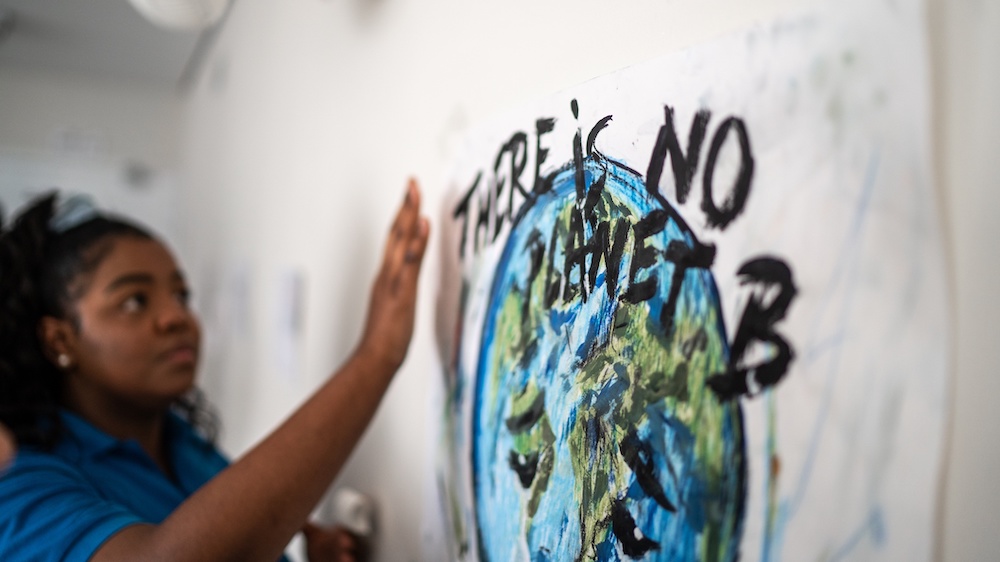If you’re interested in sharing your opinion on any cultural, political or personal topic, create an account here and check out our how-to post to learn more.
Opinions are the writer’s own and not those of Blavity's.
____
"I shouldn't be up here. I should be back in school on the other side of the ocean. Yet, you all come to us young people for hope. How dare you,” said Greta Thunberg, a young climate activist and one of the most influential young people today, as she addressed the 2019 United Nations Climate Action Summit.
Her words fully encapsulate the frustration of youth desperately trying to be heard. Today it is difficult not to see the adverse effects of climate change around us. Truly, climate change is one of the world’s most critical challenges to date. At present, global coordination and cooperation emphasize countries as the key changemakers for climate action. But we are underutilizing a major stakeholder group: young people.
As a young person, it is devastating to feel like we are fighting in vain because we do not have enough platforms and spaces to have youth representation on this issue. Luckily, in some cases, we have created our own. In September 2019, thousands of young people protested in New York City and other cities around the world, in the Global Climate Strike, to raise their voices for more action towards tackling climate change issues. This event preceded the United Nations’ Global Climate Action Summit. There, Greta was able to do her part to advocate for a more serious address for climate action with her emotional plea. But how many of these spaces are we invited to?
Young people marching and protesting do not suffice. There are simply not enough ways for young people to be civically engaged in the decision-making and policy-making processes regarding climate action. Our young voices are strong, but the substantial support needed is simply not there for us to turn our fervor into reality. Youth desperately need a seat at the table.
Young people are at the forefront of fighting climate change. Natural disasters, raging fires, environmental degradation, water insecurity and other climate-related issues have been prevalent in recent decades in a way that older individuals are not used to experiencing. Perhaps we take for granted that the older generation may not be as educated about climate issues as the average young person is today. In the United States’ 2020 election, climate change was ranked as a top priority issue for young voters. Youth are very attuned to this matter as one of the most pressing matters of our time, and therefore have an important role to play in addressing climate issues.
Moreover, UNICEF states that children will be most affected by climate change despite their lack of responsibility. Consequently, it recommends “making children the center of climate change strategies and response plans.” We need to ask ourselves what is hindering this approach to solutions for climate-related problems. Perhaps it is the fact that there has largely been a push for market-based solutions. “Where can a carbon tax be put?” “Where can carbon pricing be applied?” These market-based solutions are not propelling us forward in the fight against climate change as one would expect.
Further, the international agreements which aim to address climate issues largely fail to hold countries accountable at the most basic levels. This is best exemplified by the United States’ decision to withdraw from the Paris Agreement in 2017. A country that has consistently been one of the top greenhouse gas emitters was able to relinquish its responsibility to the global community to reach the targets of the Agreement. How can countries be able to take such liberties with international agreements and accords? It begs the question as to whether governments and policymakers are truly accounting for the future of the world’s youth and are doing the most they can. To all of this, I ask, what good is money if there is no planet to make or spend it on?
In mid-February, Texas experienced record cold and snow. A few weeks ago, a rare snowstorm covered the northwest desert in Saudi Arabia. And of course, the earth is still warming as we speak. These now “rare” events are only going to continue and get worse unless we take action.
Climate change affects us all, right now. As young people we need:
-
More opportunities for youth to directly influence change and policy.
-
Open dialogue between youth and policymakers regarding climate action to make solutions more responsive to issues unique to young people.
-
School programs that allow young people a start in climate action work, beginning with addressing the sustainability practices at their schools.
-
More investment and support for climate change education catered to the everyday person and led by youth, so that we all take responsibility and are held accountable for our actions.
-
Programs that teach youth how to turn their innovative ideas into practical and implementable plans.
-
More opportunities for young people to gain the expertise needed to advance the work necessary for climate action.
We are our primary hope and we need to be the change. We are eager and ready to tackle climate issues for ourselves, as it is increasingly clear there must be new and innovative ways to tackle the climate issues. Youth desperately need a seat at the table to contribute to policy and decision-making for our future when it comes to climate action and environmental justice. Will you listen to us?
